
|
NATIONAL TREASURES
The Flag - 1818 to The Civil War
Years of Expansion, Political Reform,
Sectional Controversy & Turmoil
|
|
|
Twenty Stars 1818 to 1819
|
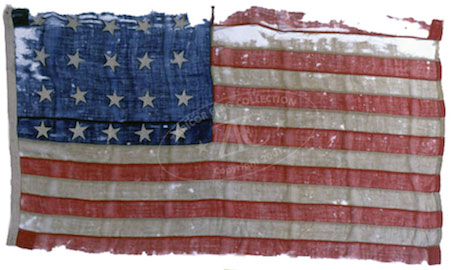
|

|
|
ZFC0421Â 20 Star U.S. Navy Boat Flag & Ensign, 1818, former Flayderman Collection. This particular design of the national flag was flown for only one year following the admission of Mississippi (1817) and Illinois (1818) into the Union. Read more
|
ZFC0625Â U.S. 20 stars and 13 stripes confirming Mississippi as the 20th state. This period example was made to indicate the admission of Mississippi as the 20th state into the union on December 10, 1817; and would remain accurate until the admission of Illinois
on December 3, 1818, a period of only 358 days. Read more
|
|
|
Twenty-one Stars 1819 to 1820
|

|
|
ZFC0422  21 Star U.S. “Grand Luminary†Flag, 1818 - 1819, former Norm Flayderman Collection. The 21 Star Grand Luminary flag represented the new state of Illinois, admitted in 1818 when James Monroe was president. It was officially in use for only one year, replaced in 1820 when Maine and Alabama joined the Union. Read more
|
|
Twenty-two Stars 1819 (Unofficial)
|

|

|
|
ZFC3582Â U.S. 22 Star Flag 1819-1820 Converted to a 26 Star Flag. This U.S. 22 Star Flag was converted to a 26 star flag to represent the new state of Michigan as our 26th State. There was never an official 22 star flag in history. Alabama the 22nd state entered the Union quickly followed by Maine making then next official flag the 23 star flag. Read more
|
|
Twenty-four Stars 1822 to 1836
|

|

|
|
ZFC2509Â U.S. 24 Star Pennsylvania Militia color 1822 - 1836.
6 Point Silver Stars. One of the half dozen oldest flags of Pennsylvania surviving depicting the national flag. Later in the conflict,
on April 2, 1865, the 54th Pennsylvania Unit. Volunteers broke through the siege lines around Petersburg, Virginia recaptured
this flag. Read more
|
ZFC3581Â U.S. 24 Star Flag admission of Missouri as a new state of the union. U.S. Flags bearing 24 stars were current for over 14 years, from 1821 to 1836, a formative and important period in U.S. History. Even so, they are relatively rare, as many are believed to have been converted into higher star counts. Read more
|
|
|
Twenty-five Stars 1836 to 1837
|

|
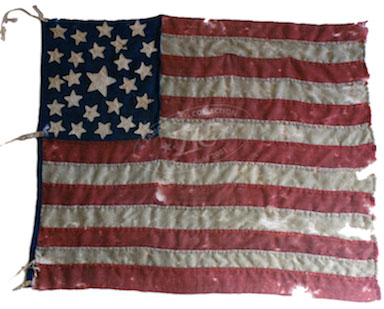
|
|
ZFC2406Â 25 Star U.S. Flag. This flag was displayed as an ensign on a boat chartered by Dr. Ledyard, an American dentist practicing in Constantinople in the 1880s. He would entertain members of the American expatriate community on the national holiday. Read more
|
ZFC2582Â 25 Star U.S. Flag, scatter pattern with large center star, 1836 - 1837. In 1836, one star was added to the U.S. Flag to represent the new state to the Union; Arkansas, bringing the total number of stars to 25. There were thirteen stripes
representing the thirteen original colonies. Read more
|
|
|
Twenty-six Stars 1837 to 1845
|

|
|
ZFC0606 26 Star U.S. Flag - “Gildersleeve Meteor Flag.†Boleslaw Mastai attributed fanciful names to star patterns appearing on his flags. Most of these names are not known to have been used historically. He called this the “Gildersleeve Comet Flag†or the “Shooting Star Flag†and saw it as rushing headlong into space, trailing its stars of glory. Read more
|
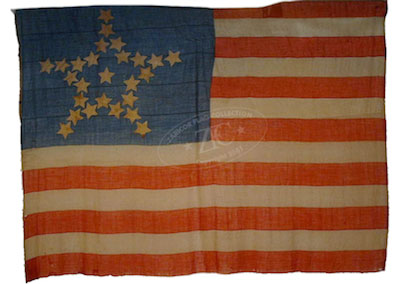
|

|
|
ZFC0696Â U.S. 26 Star "Grand Luminary" 1837 - 1845, large maritime or institutional flag. This period example 26 star U.S. flag was conceived upon the admission of Michigan as the 26th state on January 26, 1837. This would remain a popular design of United States flag until the admission of Florida on March 3, 1845. Read more
|
ZFC2386Â U.S. 26 Star Flag - Michigan as the 26th state of the Union. This hand sewn 26 star United States flag was made to indicate the admission of Michigan as the 26th state on January 26, 1837; and would remain accurate until the admission of Florida
on March 3, 1845, a period of 8 years, 1 month, 5 days. Read more
|
|
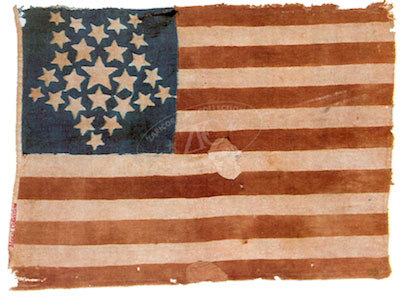
|

|
|
ZFC0607 26 Star U.S. Flag, 1837 – 1845 - Grand Luminary Political Parade Flag. During the presidential election campaigns of 1840 and 1844 the U.S. flag was integrated into the campaigns. Small silk, Grand Luminary flags, such as this, were freely distributed to political partisans to use at ralleys and parades. Read more
|
ZFC0634 26 Star U.S. flag commemorating the addition of Michigan to the Union. This is a 26 Star flag commemorating the addition of Michigan to the Union on January 26, 1837 with stars of various sizes arranged in a tilted “Great Star.†This flag is thought to be one of the earliest examples of printed parade flags. Read more
|
|
|
Twenty-seven Stars 1845 to 1846
|

|
|
ZFC1452  27 Star U.S. Military Storm Flag - Florida’s admission into the Union March 3, 1845. This period example 27 Star United States flag was made to indicate the admission of Florida as the 27th state on March 3, 1845; and would remain accurate until the admission of Texas December 29, 1845, a period of only 9 months, 26 days. Read more
|
|
Twenty-eight Stars 1846 to 1847
|

|
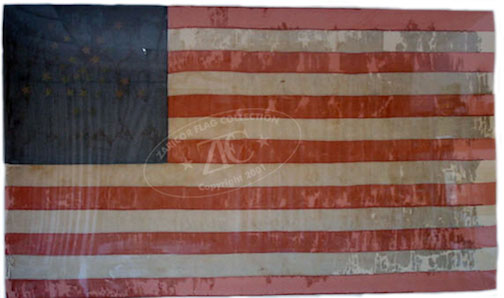
|
|
ZFC3368Â 28 Star U.S. Flag - Admission of Texas to the Union on December 29th, 1845. This Twenty-eight star flag is one of the rarest American flags to survive. This flag may have been used for Naval or maritime craft, and possibly commercial vessels. Read more
|
ZFC1444 U.S. 28 Star flag made to indicate the admission of Texas as the 28th state to the Union on December 29, 1845. This U.S. 28 Star National Flag in a “Grand Luminary†star pattern; the National Color of the 4th Louisiana Militia, raised in1846,
but disband before seeing any combat. Read more
|
|
|
Twenty-nine Stars 1847 to 1848
|

|
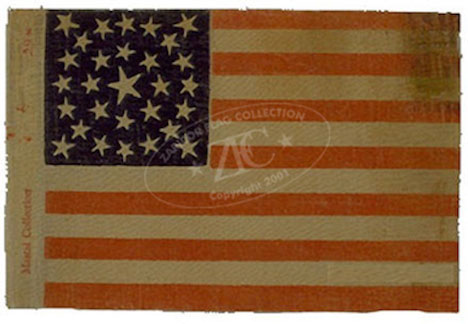
|
|
ZFC2567 U.S. 29 Star Flag 1846 - 1848 “Diamond Pattern Starfield.†Visually appealing and highly desirable, flags with diamond pattern star-fields such as this have never been encountered prior to the existence of 29 Star flags. Diamond pattern flags have also never been discovered since the conception of the 37 Star flag. Read more
|
ZFC0628 29 Star U.S. Flag - Political Parade Flag, 1846 – 1848. This flag was likely made for the 1848 presidential election, when James K. Polk was replaced by Zachary Taylor before Wisconsin’s admission in May of 1848 which made the flag officially obsolete. Read more
|
|
|
Thirty Stars 1848 to 1851
|

|

|
|
ZFC0636Â 30 Star U.S. Flag, 1858 - 1850, 1st U.S. flag to fly over Wilmington, NC 1865. This U.S. flag represents the admission of Wisconsin to the Union. The Compromise of 1820 called for a careful pairing of free and slaves states in order to maintain parity between North and South in the U.S. Senate. Read more
|
ZFC1456Â 30 Star Political Parade U.S. National flag. This 30 star version of the U.S. national flag played its role in the presidential campaign of General Taylor in the form of numerous inexpensive small flags, probably made by Annin & Co. of New York, a flag business founded in 1847. Read more
|
|
|
Thirty-one Stars 1851 to 1858
|
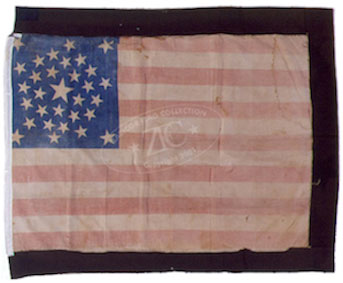
|

|
|
ZFC0125Â U.S. 31 Stars Mourning flag - Mourning border for Presidents Taylor and Lincoln. In 1850 President Taylor died, the border of this flag was decorated with black silk crepe to indicate his death. It is speculated that this flag was brought out again in 1865 in honor of President Lincoln, after he was assassinated
in April of that year. Read more
|
ZFC0233Â 31 star U.S. Storm Flag, diagonal rows of stars. This flag has an unusual star pattern, somewhat similar to the truncated diamond employed on U.S. military garrison flags of the same period. California became the 31st state in 1850, with its star
being added to the U.S. flag officially in 1851. Read more
|

|

|
|
ZFC1453 Â U.S. 31 Star Flag, Pratt St. Riots, Baltimore, MD - Massachusetts Militia vs. Confederate Sympathizers. This flag is a companion piece to ZFC0022. Both flags came from the Star Spangled Banner Flag House & Museum in Baltimore; and it is likely that this was the flag displayed when the Massachusetts troops traveled through Baltimore. Read more
|
ZFC0585 U.S. 31 Star Flag Commemorating California’s Admission into the Union, September 9, 1850. This period example 31 stars U.S. flag was made to indicate the admission of California as the 31st state and would remain accurate until the admission of Minnesota on May 11, 1858, a period of 7 years, 8 months and 2 days. Read more
|
|
|
Thirty-two Stars 1858 to 1859
|
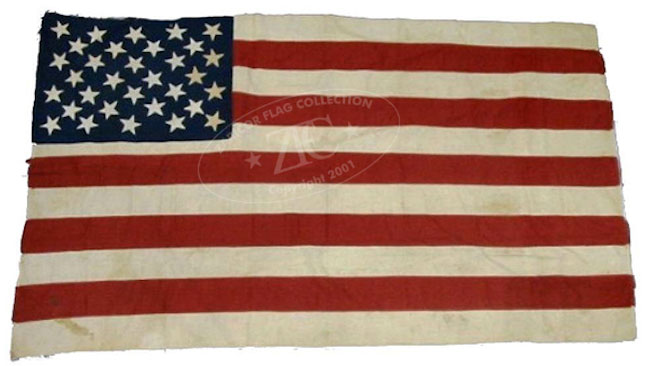
|
|
ZFC0651 U.S. 32 Star and 11 stripes Flag - Minnesota’s admission into the Union. This period homemade flag was made to indicate the admission of Minnesota as the 32nd state on May 11, 1858 and would remain accurate until the admission of Oregon on February 14,1859, a period of only 8 months and 4 days. Read more
|

|

|
|
ZFC0174 Originally a 32 Star canton converted to a 34 Star U.S. Flag. The construction details of this flag indicate that it began with a 32 Star canton, for Minnesota’s admission to the Union. While 32 Star flags were official for a year, some manufacturers may
have anticipated the 33 Star Oregon flag, as 32 star flags of any type are very scarce. Read more
|
ZFC3105 U.S. 34 Star flag conversion from a 32 Star Flag. Important Civil War era Flag, the construction details of this flag, which is inscribed, “Melville, 60 E. 26th St.â€, indicate that it began with a 32 Star canton, for Minnesota's admission to the Union. While 32 Star flags were official for a year, some manufacturers may have anticipated the 33 Star Oregon flag, as 32 star
flags of any type are very scarce. Read more
|
|

|
|
ZFC2588Â USS Constitution No. 1 Ensign - 1845 to 1850. This 28-star ensign, made to commemorate the admission of Texas is from the most famous ship in the United States Navy, the USS Constitution. These U.S. ensigns with these particular star counts were official between 1846 and 1851. Read more
|






























